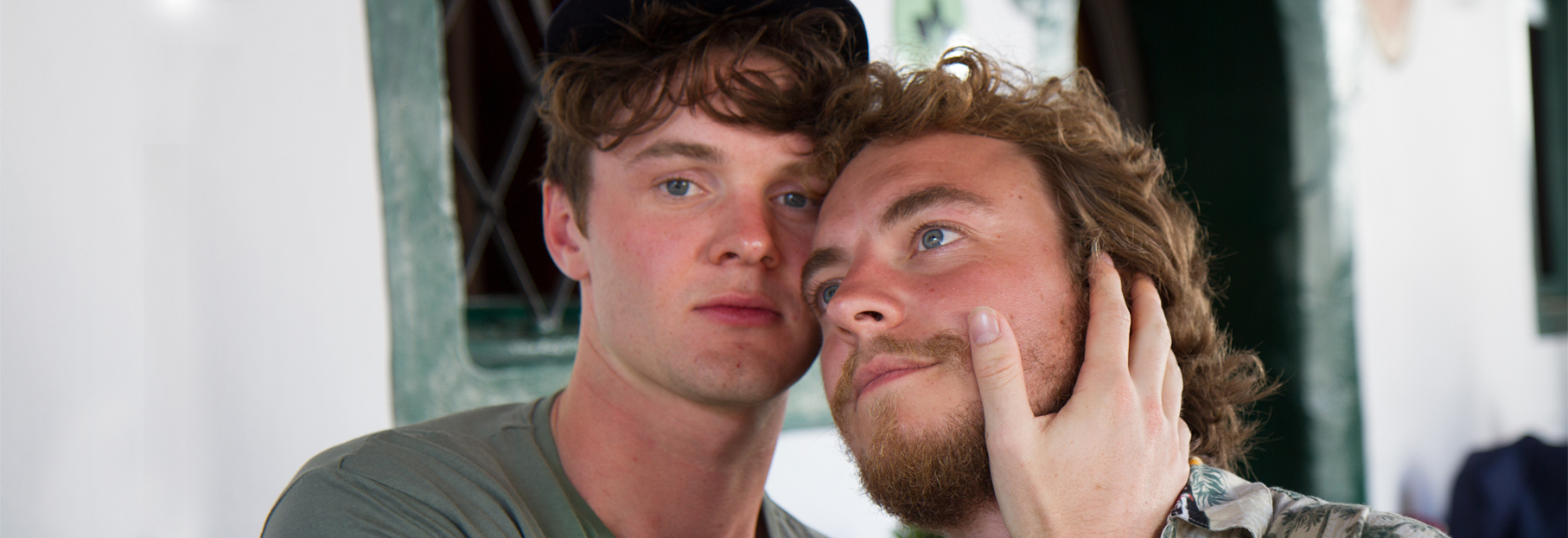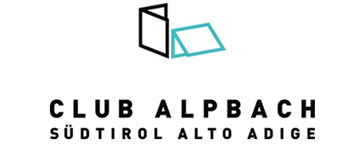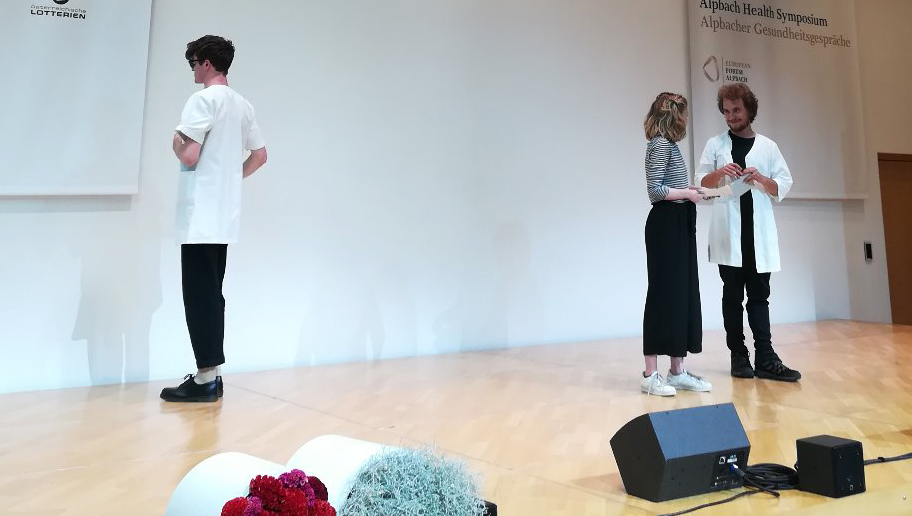
Doug Colling and Joe Mott, students of the Royal Academy of Dramatic Art London (Foto: Verena Massl)
“Why is it called a play?” the title of this yearˈs acting course as well as the prior recommendation of a friend encouraged me to join it throughout the seminar week. And I shouldn’t regret it!
The course was hosted by two charismatic drama students of the Royal Academy of Dramatic Art London, both without prior teaching experience, but equipped with an excellent sense for team-building and for creating trust in a new group. And that’s what happened incredibly quickly in our seminar group!
Already on the second day we all agreed of feeling very comfortable in experimenting different exercises, whereof many were improvisations on the spot. The improvisations required a high confidence in presenting in front of others: putting together spontaneous associations, offering ideas for a scene within few seconds and accepting the ideas by others and then giving the full commitment to it.
I was asked many times, whether we would finally present the play in front of everybody, which we are being trained for. However, I found it rather difficult to explain that the seminar consisted of many different exercises, all of which are crucial to acting: self-awareness and the ability to present in front of others. It was very much about the process during the six days, both on the individual as well as on the group level and thus difficult to transmit to people who have not been part of the process itself.
Therefore, I decided to meet our teachers Doug and Joe for a coffee in the legendary Gasthaus Jakober in the centre of Alpbach to have a chat on the main themes of the seminar: commitment, self-awareness and mindfulness. Finally, we finished by discussing on the fragile concept of freedom when working as artists and in specific on their personal perception of freedom as actors.
——————————————————————————————————————————–
Hi Joe, hi Doug! Thank you for taking time to meet up and have a little chat. Actually, incredible but true, the seminar last week was the first workshop you held – being in the role of teachers and not of drama students as usual. And as a participant I have to admit: you did an amazing job!
As workshop-leaders you selected a variety of exercises that required to improvise scenes in pairs or small groups, where it was crucial to accept an idea offered by others and to commit fully to this decision. How important are these concepts of commitment, self-awareness and of just going with the flow for you personally and your career as actors?
Doug: It is all about getting yourself out of your own way. Especially with acting I think, because it can become kind of a logical thing and you definitively can overthink it. Actually, it can be much simpler, but the hard thing is about being able to release yourself into it and not think too much about it.
Joe: And if you are doing a play you need everybody that is involved to be working together, every single play that you do is like an ensemble-piece. So, those exercises are really important for creating a space, where people are free to try things and to get it wrong. That is the most important thing, because if you stay in the safe zone of what you are comfortable doing, then it becomes boring and dull very quickly. Whereas if you feel safe enough in the environment and the people you are with, to fuck up and look like an idiot, then good stuff comes out of that. So, it is about messing up and being alright with that.
I totally agree! Just yesterday after the career lounge organized by CASA, we argued with one of the experts on how important it is to allow mistakes – regardless on the position you might have in a company or institution.
Jumping over to a different concept: You included a lot of exercises for self-awareness and mindfulness in the seminar. Why?
Doug: Having a sense of mindfulness as a tool is very important I think. I have been introduced to it through school and it does not necessarily have to be formal meditation or meditative practice. There is an essence of it in a lot of what we do in drama school, because it’s just about having a sense of alertness and presence. So that when you are in a scene, all your attention is on that and you don’t get carried away. It is about what is happening between the people on stage in this one specific moment.
Joe: Certainly, with our generation and now that everything is on screens, no one is willing to just sit, be with themselves and have nothing to do. If I sit down and have got nothing to do I immediately check facebook or twitter, for the tenth time a day. Whereas I think, the mindfulness actually gets you in touch with your emotions, which are the tools that you use in acting. That’s what you have to have, you have to be vulnerable! You have to be in immediate contact with your emotions.
Doug: It is also about working from a place of freedom and working from a place where you feel relaxed, not only in your body but also in your mind. Because then you are not constantly worrying about your decisions and get a sense of playfulness. That’s when I think the most interesting things are happening, out of a sense of freedom and alertness.
I think you have mentioned a very important keyword: freedom. Do you feel free as actors? I mean, now you are still in drama school, but there is a really competitive market waiting for you. Do you have the feeling that acting is still giving you more freedom than having a nine-to-five-job with a long term contract, not having to chase one job after the other?
Joe: It depends what you want I guess, from your acting career. I do acting because I love it! I think it is a kind of science, because you are studying people and what it means to be a human in a certain period. I mean, if you want to go to Hollywood and do all of that, of course you have to do deal with the ugly side of business and things like that. Actors get away with so much more: we are allowed to cry in public and we are allowed to sing and dance ̶ and all of the things that everybody does, but behind closed doors, because it is a bit weird. We get to be in touch with what it is to be human and we get like a free pass in a way. I do feel free, yeah!
Doug: I’m sure it is like with anything else when anyone has a passion and they are able to do it often and lucky enough to make it into a career, which is what we are trying to do. Then there is a kind of sense of freedom in that. But it can also be quite imposing and stressful a lot of the times; because sort of what we were saying before, acting is so much about emotions and thoughts. And you can get so caught up in that side of things and become very self-analytical. Because all you are dealing with is yourself and your own emotions, your own history. That can be quite though sometimes…
Joe: … but then the joy comes in the freedom of being able to switch. Actors are just people that haven’t made their minds up yet: do I want to be a doctor, do I want to be a lawyer or a politician? Well, actually I can just play different ones and experience it. And when you get bored of it you get another job, playing a clown or a criminal!
Great, thank you! Can you just share with us what you most like about Alpbach?
Dough: It’s just an incredible fertile place. Having so many people around, with all these new ideas. I think it is really important to do this, to bring people together from different areas, but with a shared interest in something. It is a real buzz around that place!
Joe: Certainly, with what is going on at the minute, it is so nice to see young people, coming together to try and figure out stuff and how we go forwards. Actually, all young super-smart people, from different walks of life ̶ it kind of restores my faith a little bit, that we might be alright. And, it is one of the most beautiful places I have ever seen!
Verena Massl


 Italiano
Italiano